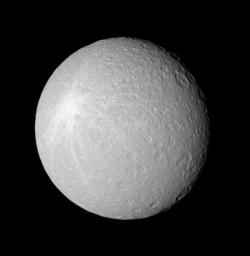
|
Bright Ice Below
- Click the image above for a larger view
- Full-Res JPEG (726 x 742) (36.3 kB)
- Full-Res TIFF (726 x 742) (539.5 kB)
Caption:
Rhea's crater-saturated surface shows a large bright blotch, which was likely created when a geologically recent impact sprayed bright, fresh ice ejecta over the moon's surface.
The rim of the great Tirawa impact basin can be seen near the top of the image. The giant feature is approximately 360 kilometers (220 miles) across.
This equatorial view captures Rhea's leading hemisphere. North is up and rotated 40 degrees to the right.
The image was taken in visible red light with the Cassini spacecraft narrow-angle camera on April 28, 2006 at a distance of approximately 481,000 kilometers (299,000 miles) from Rhea and at a Sun-Rhea-spacecraft, or phase, angle of 23 degrees. Image scale is 3 kilometers (2 miles) per pixel.
Background Info:
The Cassini-Huygens mission is a cooperative project of NASA, the European Space Agency and the Italian Space Agency. The Jet Propulsion Laboratory, a division of the California Institute of Technology in Pasadena, manages the mission for NASA's Science Mission Directorate, Washington, D.C. The Cassini orbiter and its two onboard cameras were designed, developed and assembled at JPL. The imaging operations center is based at the Space Science Institute in Boulder, Colo.
For more information about the Cassini-Huygens mission visit http://saturn.jpl.nasa.gov/home/index.cfm . The Cassini imaging team homepage is at http://ciclops.org .
Cataloging Keywords:
| Name | Value | Additional Values |
|---|---|---|
| Target | Rhea | |
| System | Saturn | |
| Target Type | Satellite | |
| Mission | Cassini-Huygens | |
| Instrument Host | Cassini Orbiter | |
| Host Type | Orbiter | |
| Instrument | Imaging Science Subsystem (ISS) | |
| Detector | Narrow Angle Camera | |
| Extra Keywords | Crater, Grayscale, Impact, Rotation, Visual | |
| Acquisition Date | ||
| Release Date | 2006-05-31 | |
| Date in Caption | 2006-04-28 | |
| Image Credit | NASA/JPL/Space Science Institute | |
| Source | photojournal.jpl.nasa.gov/catalog/PIA08189 | |
| Identifier | PIA08189 | |
